“Supernatural” University: Calling All Angels
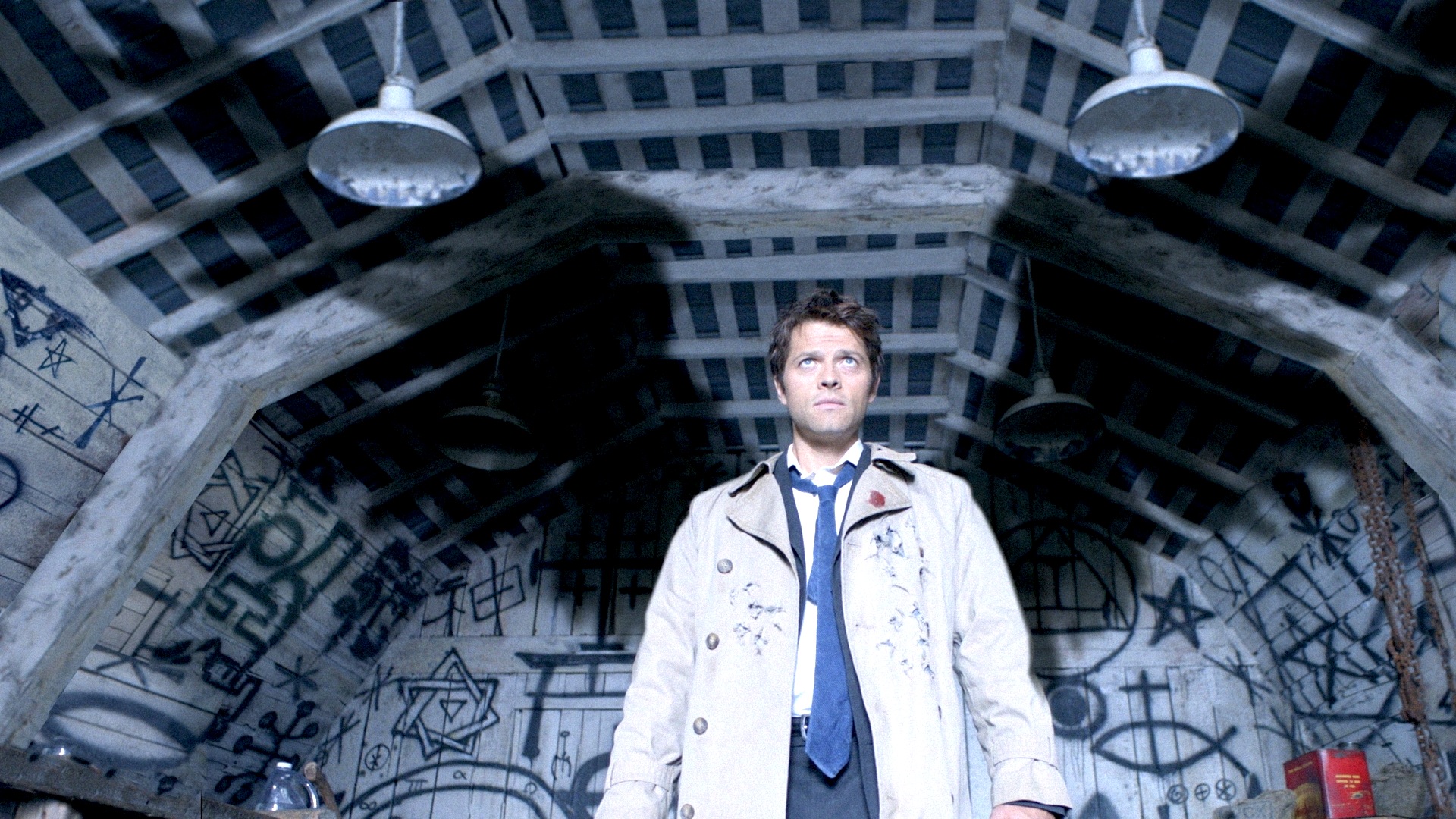
Supernatural University: Calling All Angels
This is the first of two articles exploring angels in the Supernatural universe. In this one, I’ll be looking at the role angels have played and how that developed through the history of the series, including how angels relate to monsters and humans, and how I think their role has both meshed with and changed the show’s “bible” over time. In the next article, shifting from the general concept of angels to the specific, I’m goint to explore in detail the unique role of Castiel and put forward my own theories on his nature and purpose. Welcome to a multidisciplinary Supernatural University session in myth, theology, philosophy, psychology, and the nature of television production!
My basic premises are these:
- Humans are and always have been the core of the Supernatural universe and they, not any supernatural agents, embody the force of good in the show.
- Angels formed no part of Kripke’s initial vision of the show, but the realization at the very end of season three and during the planning for season four of how a very different vision of them could be used fundamentally affected the structure of Kripke’s basic story and laid the groundwork for all the seasons that followed.
- I think Castiel represents the quintessential angel, the truest vision of what God intended angels to be. I postulate that he keeps being brought back from the dead to serve as both an exemplar and a test bed for angel development: God’s demonstration angel. He’s also been an ideal experiment for the show’s writers, a way to look at and define humanity by comparing it to something inhuman.
I’ll confess to some serious reservations about the driving premise behind season nine precisely because it harks back to and relies entirely on one of , in my opinion , the weakest ideas Kripke ever espoused: the concept that angels could become truly human simply by removing their “grace,” the power that made them uniquely angels. The idea that angels were just proto-humans endowed with grace, giving them immortality and power that God later removed from the human design, simply doesn’t sit well with me; I’ll have to deal with that as the new season commences. I continue to believe that an angel remains an angel, with powers or without; my basic premise is that angels and humans remain fundamentally different.
In The Beginning …
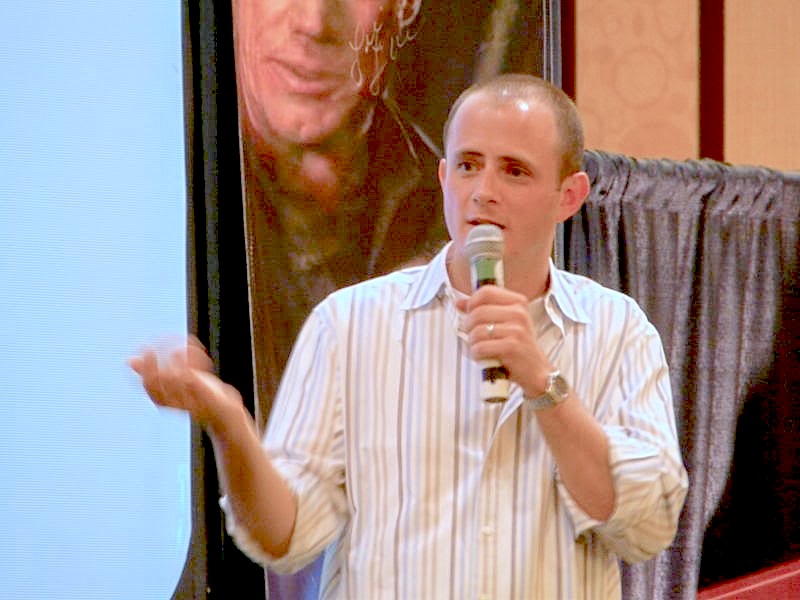
I’m going to start by giving you a reading assignment. Go to my absolute favorite Eric Kripke interview of all time, a detailed transcript by Mo Ryan of her long ComicCon conversation with him published back in August 2009. Go now. Well, you might want to pour yourself a tall drink first, because it is VERY long, but it’s worth every single minute. Go ahead. This article will still be waiting when you return. (If you don’t have the time right now, I’ll be recapping some high points here, but at least bookmark the article for later.)
* * *
See? Told you I’d still be here. And you’re welcome, especially if you’d never read that one before or had forgotten it since.
The bottom line is, the show as Kripke originally conceived it never included angels at all. I believe the season two episode Houses Of The Holy gave the show’s original take on angels, emphasizing that despite all the lore on angels, none of the hunters Sam and Dean knew about at the time had any experience with them. While the episode ended with deliberate ambiguity, with Sam knowing the purported “angel” was actually a human spirit and Dean contemplating the possibility that divine intervention had killed the would-be rapist, the atmosphere argued angels weren’t involved.
When Kripke was asked at the first Supernatural convention Creation held in L.A. back in March 2008 (I was in the audience, so this comes from my own ears), why we’d seen demons but never angels or other truly “good” supernatural creatures, he said Sam, Dean, and the other human hunters, however flawed, embodied the force of good in his story. Struggling, imperfect, conflicted humans who nonetheless tried to do the right thing were his heroes. Meaning no disrespect to Sam, Kripke said that between the brothers, Dean was the hero of the story because he was fully human, believed in nothing, and had no faith , yet still kept fighting to save people and do good. Concerning angels, Kripke laughed that we would never see Touched By An Angel sappiness on his show. Chuckling that he’d learned never to say “never,” he did allow that if there were down and dirty versions of angels, however, then maybe… At that same convention, he said the show had about a 15-page bible describing the basic overall story arc, and said he always knew as part of it that we wouldn’t ever see Lucifer.
When show storylines diverged from reports and interviews in which Kripke and others made statements like those, some fans complained they couldn’t trust Kripke , or later, Sera Gamble or Jeremy Carver, because they “lied” about what they were doing with the show and its characters. That’s a foolish statement, because what things such as angels and Lucifer really point out is how different writing for television is from writing a novel. Unlike a book, a TV show is a constantly changing and developing collaborative activity affected not only by the creative imaginations of the different showrunners and writers participating in the room from year to year, but by real-world considerations that close and open doors the writers and showrunners hadn’t ever expected.
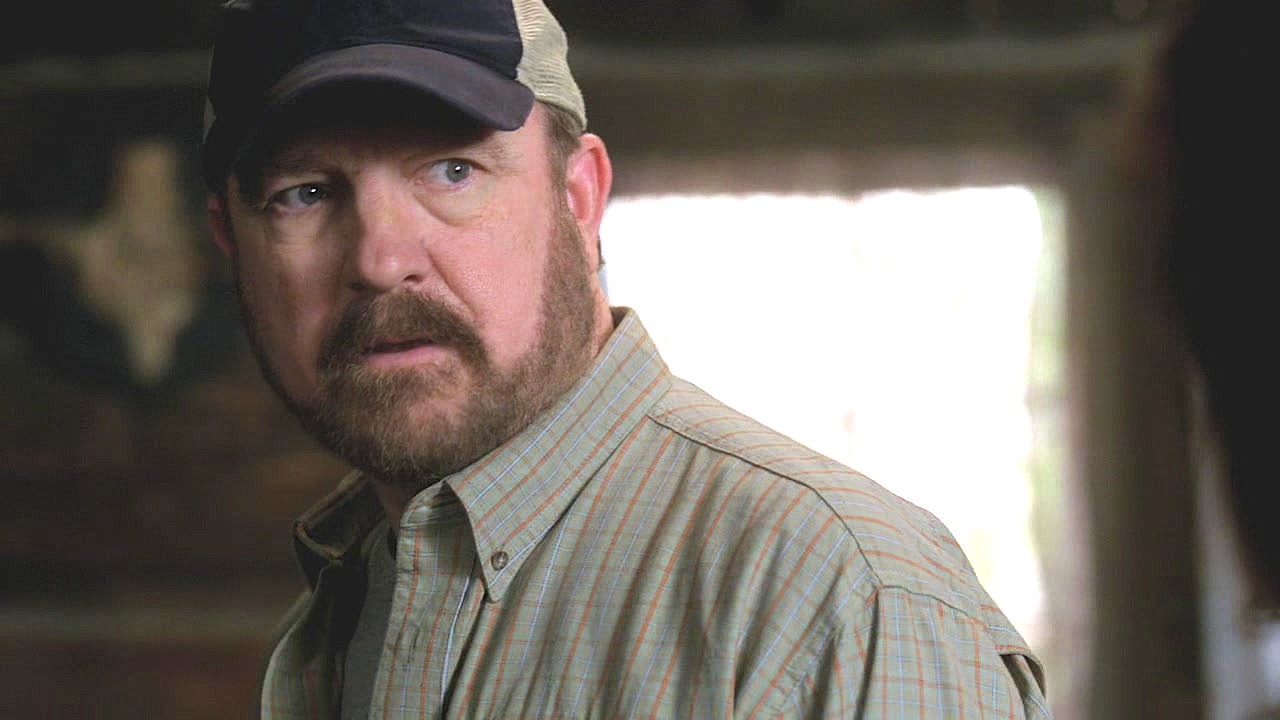
The creation of the character of Bobby Singer is a classic case in point. At the second Paley Festival Supernatural panel in 2011, Kripke explained he’d intended the Winchesters to go back to Missouri Moseley for help in Devil’s Trap, but Loretta Devine, the actress who’d played her, had been hired on another show and wasn’t going to be available. Kripke decided instead to think about what an older male friend of John’s would have been like, and when he came up with the idea of a crusty, avuncular type (who was originally going to be named Bobby Manners, as a tribute to both Bob Singer and Kim Manners, until the name couldn’t clear the legal department!), Bob Singer said he knew the perfect actor for the job, and so we got Bobby Singer played by Jim Beaver. The magic of Jim as Bobby produced ideas and generated new stories that were never contemplated in the show’s bible, but still fit within the overall story arc.
The 2008 L.A. convention occurred just after the resolution of the Hollywood writers’ strike, which had unexpectedly and drastically shortened the show’s third season. The strike disrupted Kripke’s original plan for the season, which , as he explained later , would have seen Sam going darkside and developing his demon-given powers specifically to do the right brotherly thing and save Dean from his demon deal. With too little time left in what remained of the season to execute that original story, but knowing they’d be back for another season if only because the strike had also prevented the creation of pilots for new shows, Kripke decided to postpone the ‘Sam’s powers’ storyline until season four and do the heart-stopping unexpected by killing Dean and sending him to Hell in the season three cliffhanger.
Of course, that meant the writers had to come up with a way to get Dean out of Hell, and fast, because leaving either brother off-screen for any length of time simply wouldn’t work. And at some point in the planning process of wrapping up season three and figuring out season four, inspiration struck: angels could rescue Dean, and they could fit neatly into the show’s human-centric structure if they were monsters. And not just any monsters, but the ultimate villains , the hidden ones behind it all , who would save Dean for their own purposes. That’s the picture Zachariah finally revealed to Dean in all its hideous glory in the beautiful room in Lucifer Rising.
I submit from Kripke’s own words in the Mo Ryan interview and elsewhere that was nowhere in the show’s original bible, but it both fit in with and changed everything.
It wasn’t the first such revolution on the show, but I’d argue it was the second-biggest one, right behind Bob Singer having pointed out around the fifth episode of season one that the real story of Supernatural wasn’t the horror anthology road trip through urban myth and legend Kripke had originally pitched and started to shoot, but was instead the relationship between the Winchester brothers. Kripke admitted that truth in dozens of interviews and at the March 2006 Paley Festival appearance, so those facts are not in dispute. Kripke first came up with the horrific image of Mom burning on the nursery ceiling to give his characters a personal reason to know about and hunt the supernatural, but when he wrote that scene and shot the pilot, he had no more idea than the rest of us how or why she died that way, because it didn’t really matter to what he wanted to do. The brothers and their classic car were just meant to carry us into the stories, not become the story. But when they became the story, the show hit its real stride. Instead of breaking the stories by talking about the monster they wanted to use, the writers began to start with what they wanted to put the brothers through and found a monster plot that would let them do it. And with Jensen Ackles and Jared Padalecki in the leading roles, the show sang.
I’d love to get the chance someday to seat at least Kripke, Singer, Gamble, Ben Edlund, and Carver around a table and ask them to walk through when and how each of the various elements of the central mythology we’ve all now come to take for granted actually developed and made their way into the show’s writers’ bible , Mary having been a hunter who made a deal for her husband’s life, Sam having been fed demon blood as a baby as the outcome of that deal, the reason for the whole setup having been to produce a fitting vessel for Lucifer to occupy on his escape from Hell, the brothers confronting the apocalypse, and more. We know the show’s mythology always kept changing and developing as time went on. For example, in a BuddyTV.com interview posted on February 5, 2008 during season three, Kripke credited Ben Edlund with having come up with the idea that all demons were once human, with all that would mean for Dean’s journey to Hell and for later strategies to deal with demons, from burning their bones in season six to “curing” them in season eight.
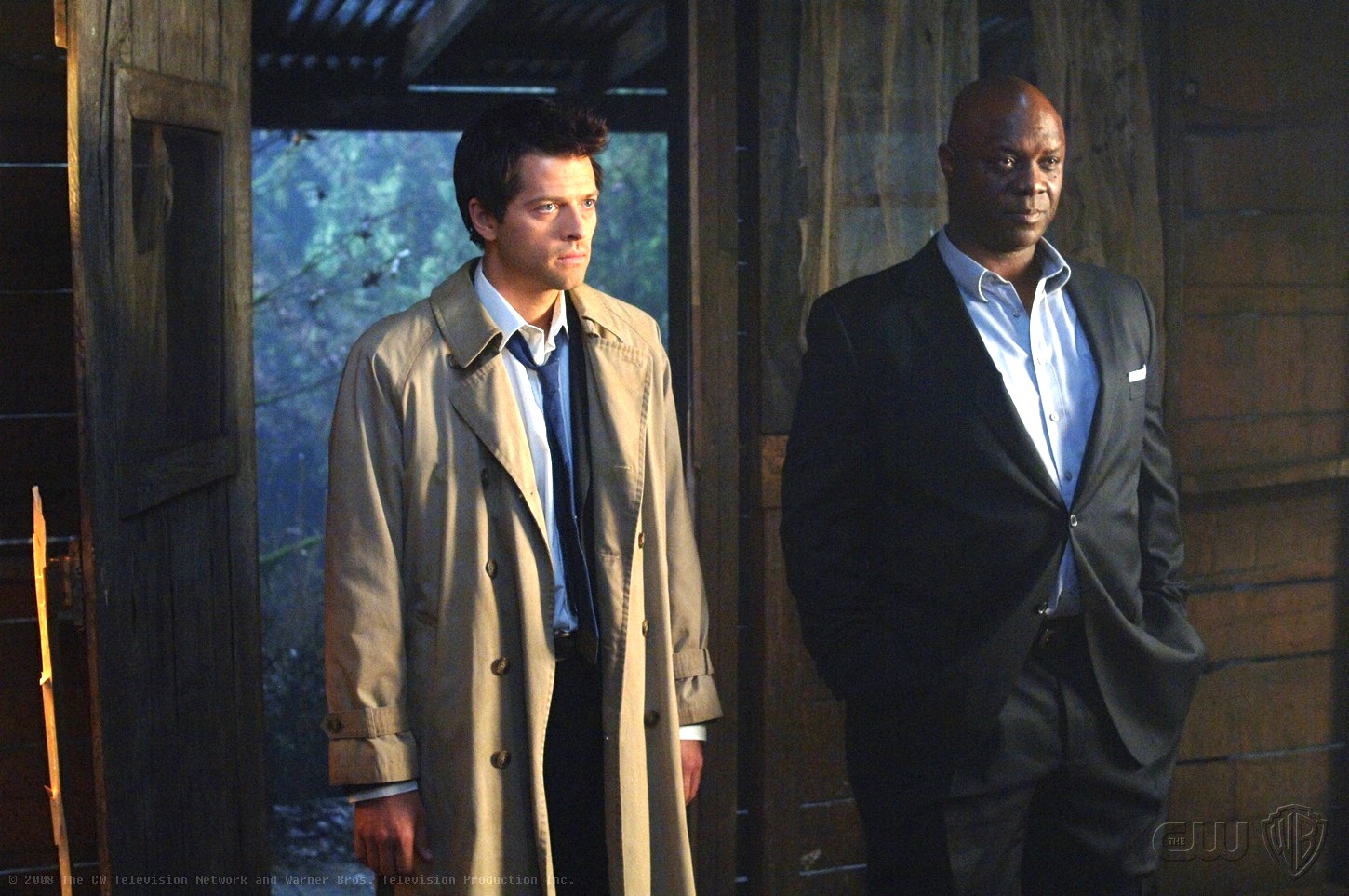
But back to the angels. In seasons one and two, Kripke had already delineated his core tragic good-versus-evil concept to force the brothers into inescapable conflict both with each other and inside themselves. Kripke’s setup had innocent, good-hearted Sam, unknowingly corrupted by a cunning demon when he was still a baby and wanting only to escape the hunting life, seduced into following the road of good intentions to damn himself and unwittingly bring about the planned triumph of evil, while nurturing, protective Dean would gradually and to his horror be tormented by the cruel dilemma of having to kill his beloved brother to save the world, or let the world be destroyed. It was at heart a story of humans fighting evil both within and outside themselves, struggling to be and save a family. Angels were nowhere in it.
But then came strike-shortened season three and the need for inspiration. Forgive me if I imagine some of the conversations that might have occurred in the writing room … Hey, I was thinking; you know that expression, “God’s in his Heaven, all’s right with the world?” Well , what if he wasn’t? What if God went walkabout and after thousands of years stuck watching wars, intolerance, violence, selfishness, and environmental mismanagement, the angels got disillusioned with playing caretaker for humans? I was reading the Book of Revelation and Milton’s Paradise Lost, and I got to thinking , what if the angels got impatient for the paradise that’s promised after the apocalypse, and decided to set things up deliberately to fulfill the letter of the prophecies and just get on with it? And what if some angels , maybe a lot of angels , who didn’t rebel with Lucifer still felt the way he did, and resented the hairless apes God loved more than them? They could have been behind everything all along! We could make this the Apocalypse! Avenging warrior angels! Old Testament stuff! The angels could pull Dean out of Hell and make him think that was a good thing. And what if Sam wasn’t just being groomed to lead the demons out of Hell, but was going to embody Lucifer himself? We could draw parallels between Sam and Dean as human brothers, and between Lucifer and the archangel Michael as angel brothers! And hey: we could tell those fans who always bitch about Dean not having a piece of Sam’s ‘Chosen One’ mythology that Dean would embody Michael , except that humans are better than angels, so he’d refuse and stay human and their humanity would save them! YEAH!
While I haven’t had the chance to run my dream writers’ round table and ask my questions, I’ve guessed for a long time that this between-seasons stroke of inspired angel lightning recast all the thinking that had gone before simply because it fit so well, just adding deeper mythic elements to the roles the brothers were already playing. And from what I can see, it has been the root of every development since, including the discovery that virtually all monsters (with the exceptions of Leviathan, a direct biblical creation of the show’s God, and Death, a contemporary of God) were developed by the Leviathan-related Eve perverting human stock, as demons were warped out of human souls by Lucifer, and that both Heaven and Hell operate on the power of the human souls within them, with angels and demons tapping into that power to fuel their actions.
And that’s been cool. And the biggest reason it works is this: angels and demons, for all their terrifying power, both lack something. So did Leviathan.
They lack humanity. They all lack what makes us, God’s last creation, us. They lack our native emotions, our creativity, our multiple passions, our willingness to sacrifice ourselves for those we love. They lack our souls, with all the power those souls contain. And in Kripke’s universe, because we’re human , while we, unlike demons, remember we’re human, with all that means, we, and the Winchesters, win.
Because , we win.
I Like To Think Of Them As More Loving Than Wrathful, But …
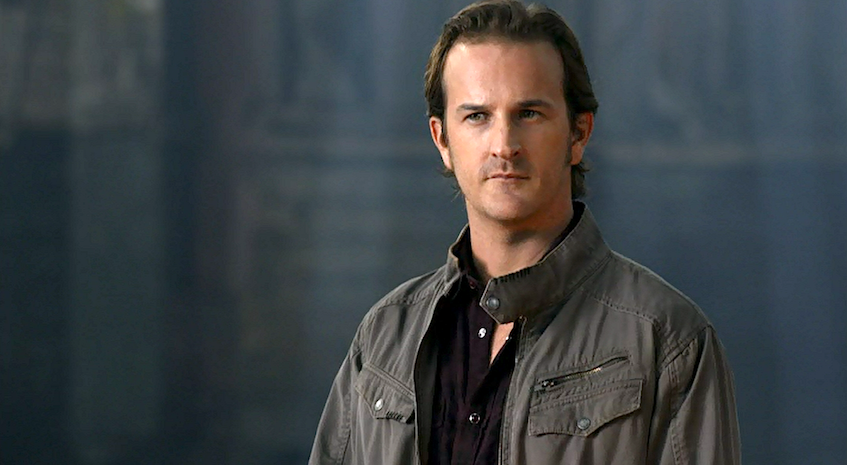
Supernatural has always put its own distinctive stamp on the creatures of myth and legend peopling its stories, and angels are no exception. Making the most powerful angels effectively monsters and casting them as the villains ultimately responsible for the apocalypse rather than the expected good guardians helping people was a brilliant twist. Making angels as individually distinct and varied as humans took the cause even further, especially when the story made apparent that rank and file angels such as Castiel, Anna, and Samandriel were not aware of the machinations of such higher level angels as Raphael, Michael, Zachariah, and Naomi. Castiel was able to become a “good” monster, the exemplar, like Lenore and Benny among vampires , that individuals could develop unique personalities and defy expected norms. I think the vivid qualities that Misha Collins brought to Castiel inspired the writers to take the character even further down that path than they originally intended.
But the key thing to remember whenever angels are involved is this: they are not human. Whether they sympathize with humans, as Castiel and Gabriel eventually did; despise or even hate humans, as Lucifer, Uriel, and Raphael did; appreciate but remain remote from humans, as Metatron did; envy humans, as Anna once did; or try to deal with humans as God intended, as some rank and file angels such as Castiel and Samandriel did, they themselves are not and never have been human, and understand humans only imperfectly. Both Castiel and Zachariah stressed more than once that their true forms were not remotely human. Expecting angels to think or act like humans just because we human viewers, like Sam and Dean, always see them wearing human bodies is a recipe for disaster, like equating a tiger with a tabby because they both have feline shapes and traits.
The second thing to remember about angels is: they are all ancient. Even Castiel, whom other angels called young, was alive to see humans evolve, at least according to his testament in The Man Who Would Be King. The only beings we know of who are older than angels are God, Death, and Leviathan. That means they existed for billions of years, most of that time following the orders of God. God’s departure from Heaven evidently didn’t happen until a couple thousand years ago, judging from the combination of the bible and comments by Anna and Gabriel. Some of the angels evidently began to question the limits on their existence ever since Lucifer challenged God’s preference for humans, with all their flaws; once God went walkabout, the disaffection simply spread the longer he was away. But their angelic experience is incomprehensible to us because it spans more time than we humans can even comprehend.
We learned right from the beginning of our encounters with angels in season four that angels needed to take human vessels in order to be able to communicate with humans through our normal and limited human senses. Unlike demons, who had after all once been human and thus could bully their way willfully into other people, angels had to obtain permission from their vessels to take up residence. In many respects, however, that was evidently only a token condition; Zachariah made clear many times that angels could and would use duress to gain admission. Once the angel was in control, the human soul had no voice or influence at all unless the angel granted it, and couldn’t rescind permission to evict the angel. Sam was the only vessel we ever saw who managed to regain control of his body, trapping Lucifer in it long enough to jump into the cage.
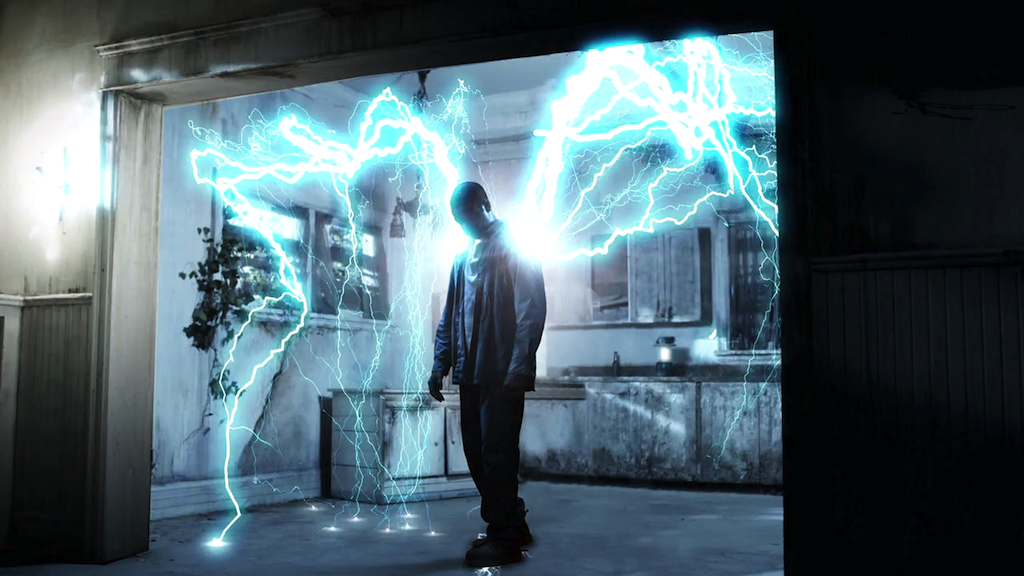
From all we’ve seen, most angels care as little as most demons about the emotions, lives, and overall wellbeing of the humans whose bodies they’re wearing. Unlike demons who simply ignore and work around physical damage their borrowed bodies sustain, however, angels are able to heal the bodies they wear, so ordinary wounds taken by the vessel body during possession don’t kill the human when the angel departs. That’s a very different situation than human Meg was left in by her possessing demon in Devil’s Trap, for example; the host died from the fall and gunshot wounds her body had sustained while the demon was in residence. Similarly, the demon inhabiting bartender Cassie in Sin City wanted to avoid damage to her host’s body simply because the body was beautiful and in excellent physical shape that the demon enjoyed. But an angel’s presence can shatter human minds, as we saw when Raphael left mechanic Donnie a drooling catatonic without a scratch on him in Free To Be You And Me. Castiel left Jimmy intact when he was yanked away in The Rapture, and Michael took better care of John in The Song Remains The Same and promised better care for Dean in the hope of persuading his agreeement, but judging by Raphael, those were their individual choices, not a general rule of angel behavior. We’ve never seen an angel in dialogue with its human vessel once it took possession; it would seem that under the best circumstances, the human is mostly locked away from conscious awareness altogether. Angels seem to take their human vessels for granted, like rental cars, giving no thought at all to the human soul or mind once the body is at their disposal.
We know nothing at all about most of the humans whose bodies we’ve met occupied by angels. We know about Jimmy only because we got to meet him when Castiel wasn’t in residence, and he remembered only bits and pieces of events during his possession by the angel; blocking the human host from consciousness seemed a common angel strategy. Witness Michael telling Dean that Adam wasn’t home at the moment when Dean offered Adam his apology in Swan Song, for example. Demons could do the same, but sometimes allowed their human hosts to surface when they wanted to torment them or use them; recall the nurse in Lucifer Rising.
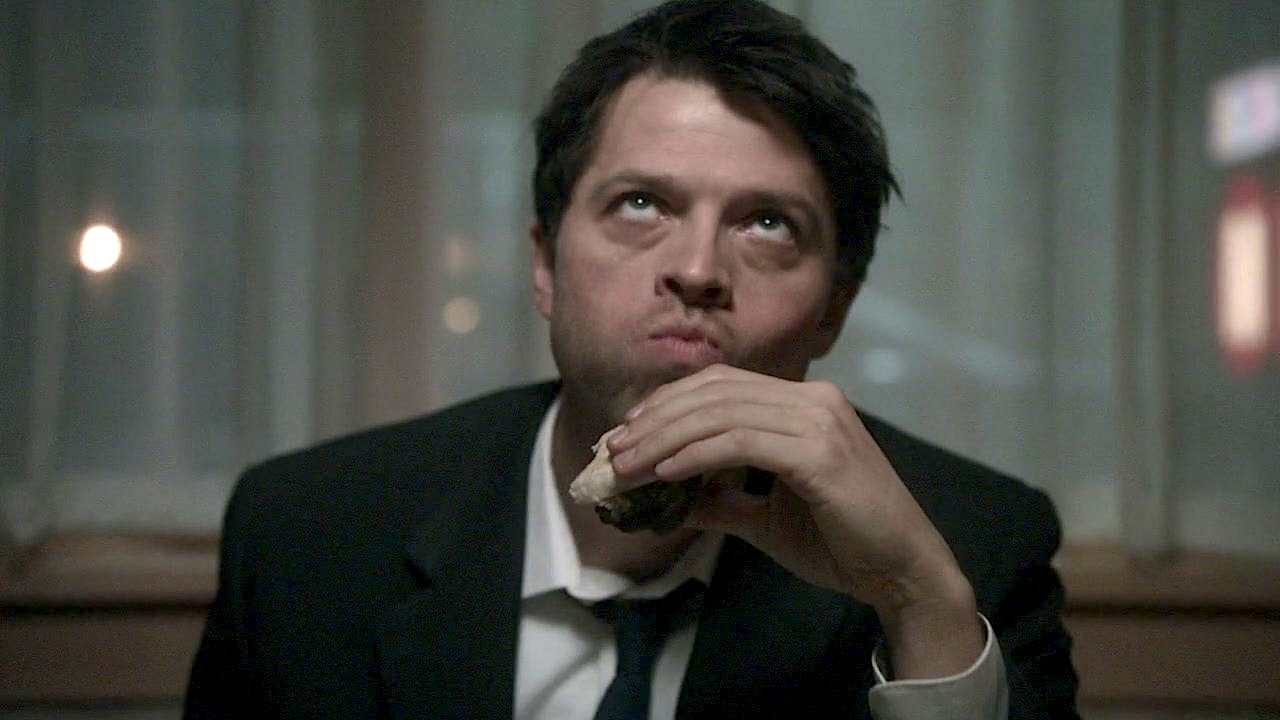
Judging from what Castiel told Jimmy at the end of The Rapture about picturing another hundred or thousand years as a vessel during which he wouldn’t age or die, we may have seen some vessels whose human souls were born millenia ago. How long was Gabriel hiding out wearing the body other gods recognized as Loki? I can’t imagine the human minds of those vessels still being intact. Jimmy had been a vessel only for a year, and still found it almost impossible to reconnect with his wife, child, and prior life in The Rapture; what chance at sanity would he have now, more than four years later? Life as an angel’s vessel seems to be a death sentence for the individual who surrenders his or her body to an angel.
And wearing a human body doesn’t grant the angel any psychological or emotional resonance with or understanding of its human host. We saw this clearly with Castiel and Jimmy in The Rapture. Once in possession of Jimmy’s body, Castiel didn’t share anything of Jimmy’s love and care for his wife and child. When Castiel later took Jimmy’s daughter Claire, the angel couldn’t comprehend Jimmy’s horror at the thought of his daughter enduring life as an angel’s vessel. Castiel acceeded to Jimmy’s pleas and freed Claire to return his essence to Jimmy’s body, but the angel still didn’t understand the man’s emotions, and as soon as he was back in Jimmy’s body, Jimmy virtually disappeared.
Castiel experienced occasional human physical sensations , he was overwhelmed by Jimmy’s hunger in My Bloody Valentine and had an erection while watching porn in Caged Heat , but perceived them merely as bodily impulses with no deeper value or understanding. Hedonistic Sebastian and Gabriel both learned to relish the sensations of human physicality , especially the delight of taste and the excitement and release of sex , but they sought out those things deliberately as pleasurable departures from angelic norms. They perceived them through both human and angel senses, not in the limited way a human would have, and enjoyed them purely for sensations they didn’t experience in angelic forms.
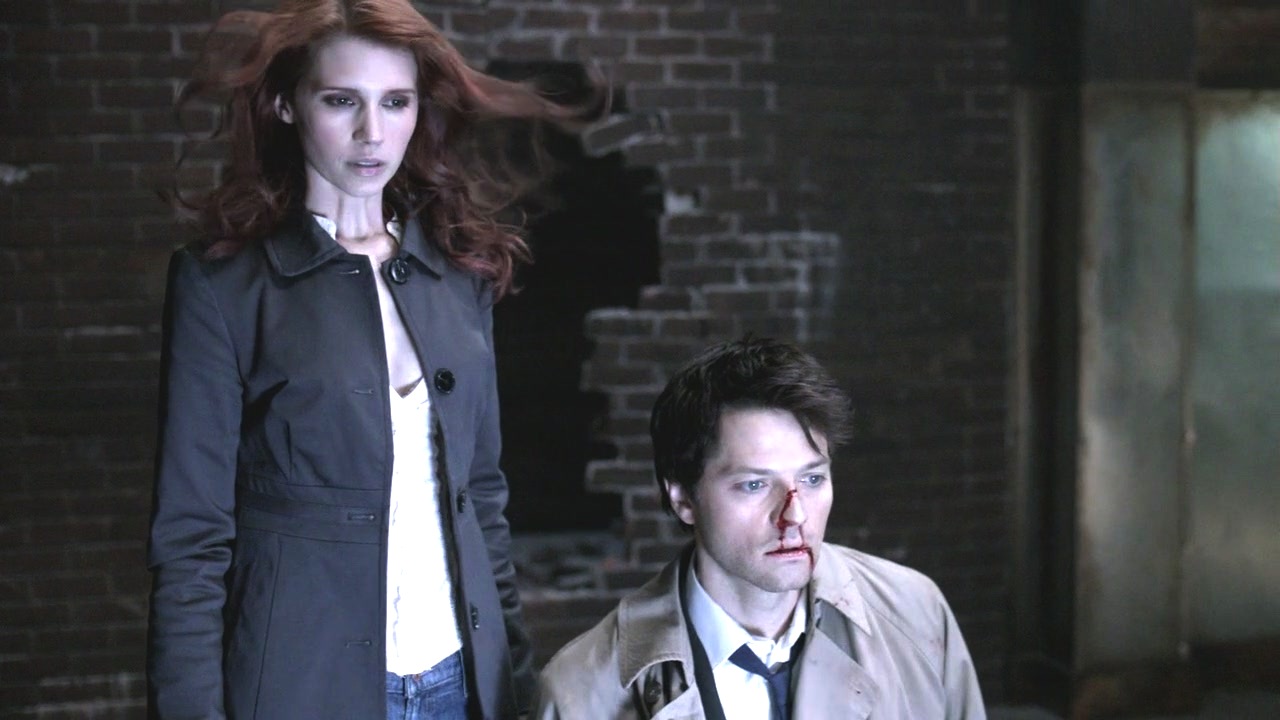
The singular exception to the angel rule was Anna. I had and still have major problems with her story in Heaven And Hell, but the bones of it , that she removed her grace, fell to Earth, was born as an infant human, and grew up not remembering her existence as an angel (apart from a hysterical incident at the age of two-and-a-half when she insisted her human father wasn’t her real father and her real father was angry with her and wanted to kill her), meant that Anna, alone among angels, actually experienced growing up in a developing human body divorced from angelic power and knowledge, surrounded by family and friends, having to learn as a human child learned. I would say Anna was the only angel who ever managed to assimilate as a human, and she achieved that only because she wasn’t occupying a vessel; she was born into a human body and grew up as a human, because her infant human brain couldn’t contain or deal with an angel’s memories.
The only other almost-human angel we met was the alternate future 2014 version of Castiel in The End. That Castiel, cut off from Heaven and abandoned by all other angels, gradually lost his angelic powers until he became mortal. Even then, however, I would argue he didn’t become truly human. He still remembered everything he had been and bemoaned what he had become and all he had lost. He couldn’t deal with it; he spent most of his time stoned, using drugs to take the edge off his curtailed, limited existence. He was still an angel with perceptions beyond human limits, remember he could immediately see that 2009 Dean wasn’t the Dean of his time, just deprived of most of his power and forced to acknowledge mortality. We’re now going to see a new take on Castiel in 2014, and I have to wonder whether he’ll be similar to or different from the bitter, sarcastic, despairing one we met in the alternate timeline.
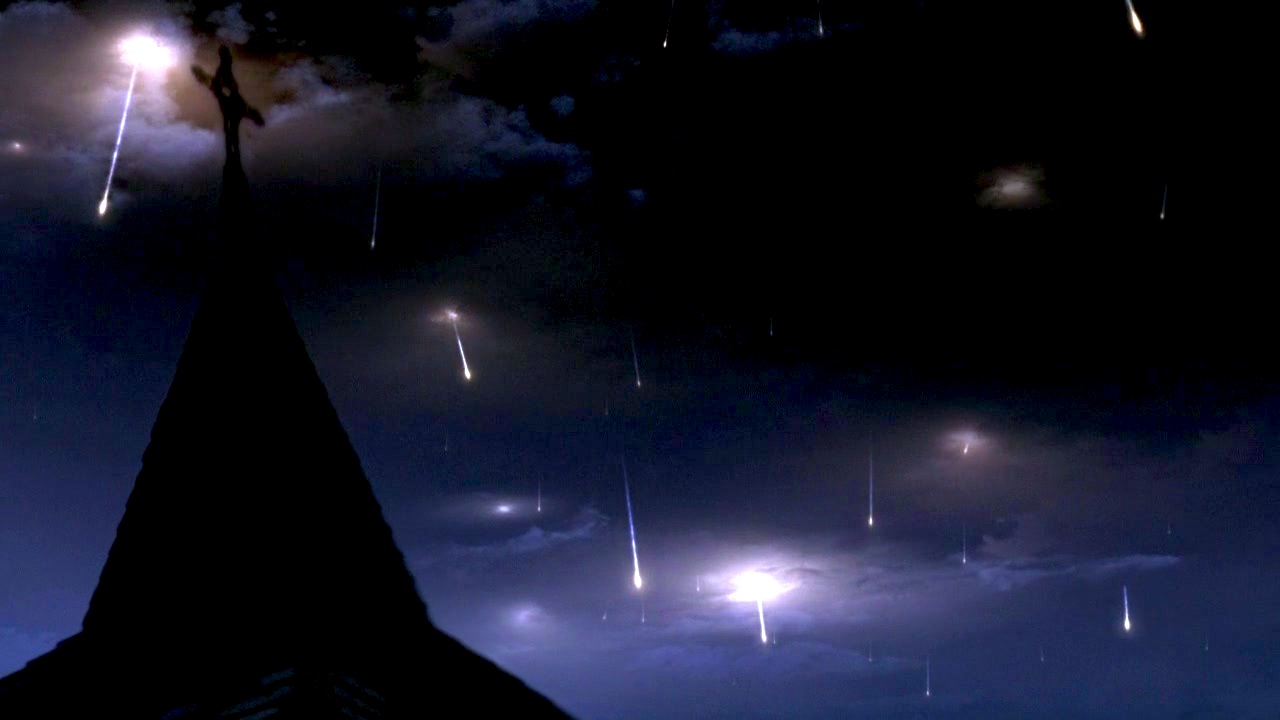
I am very curious about what we’ll learn when we meet the fallen angels in season nine. Will they be born anew as humans, the way Anna was, or will they wear the bodies of the presumably adult humans who had been their vessels? If the latter, what happened to the human souls of the bodies they inhabit? Will the now-mortal angels know they were angels? I’m assuming Castiel will know, if only because the writers already went the amnesia route with him in season seven’s The Born-Again Identity, but I wonder about the others. Will living as humans give them an appreciation for the human condition that taking vessels never conveyed? Might the angels’ exile serve to restore to them the sense of guardianship God intended them to have , the sense Naomi realized too late that they had lost , or would it further disgust them, as occupying a vessel aroused Uriel’s and Zachariah’s disdain?
So much of the story of Supernatural is built around saving people and seeking redemption. That’s been at the core of Sam’s story and of Dean’s – and it’s also been at the root of Castiel’s tale and Benny’s brief arc. I wonder if at least some of the fallen angels may discover their time on Earth provides the opportunity for them to redeem themselves from corruption and disaffection by learning to appreciate humanity from the inside and to rediscover their purpose as the guardians of God’s creation. And I wonder if the angel tablet may hold the key for angels to recover their power , their grace , and take back Heaven from Metatron. And I wonder if the fallen angels will still be split into factions, with some seeking power for its own sake as Raphael once did while others pursue nobler causes, but with all contesting for possession of the angel tablet and the knowledge it contains.
Whatever the case, it’s clear the angels, whatever form they wear, are going to be a driving force in season nine.
That’s it for now. Next up: my in-depth look at Castiel, including
- My thoughts on all the things that make Castiel different from every other angel we’ve met, and what roles he serves for both Supernatural’s in-story God and for the shows writer-gods; and
- How I think Misha’s portrayal of Castiel and the fan response to both the actor and the character may have affected the character’s development and story.
Stay tuned, but please be patient; these things take time!



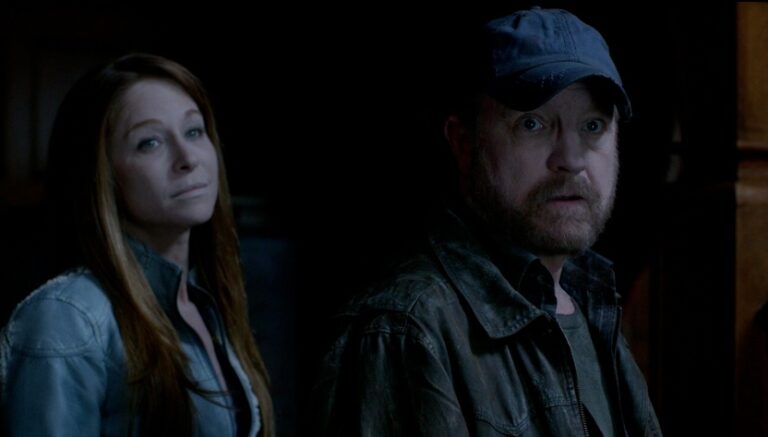
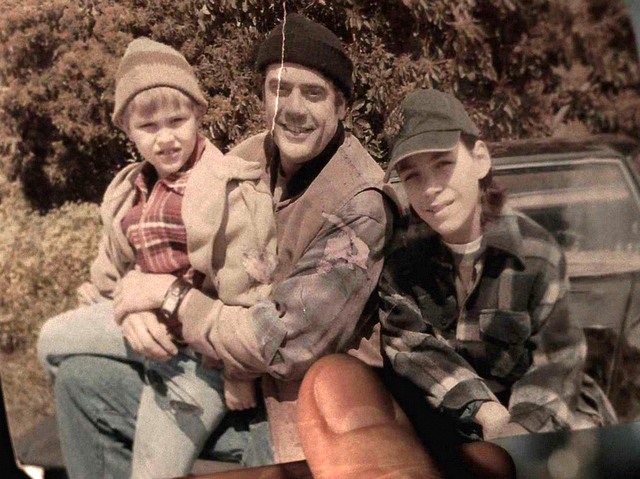
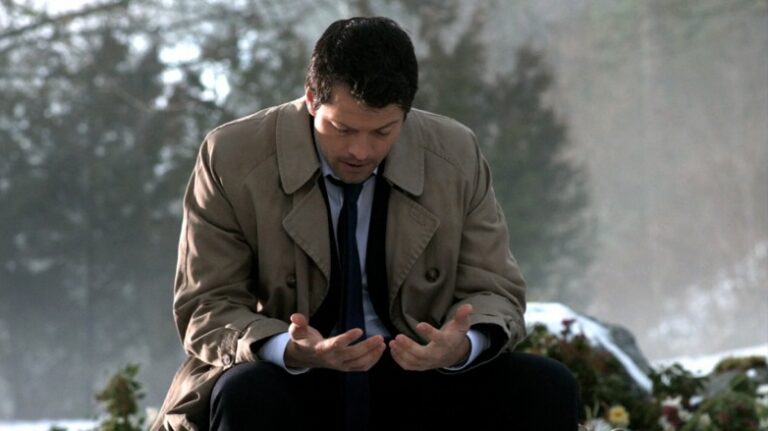
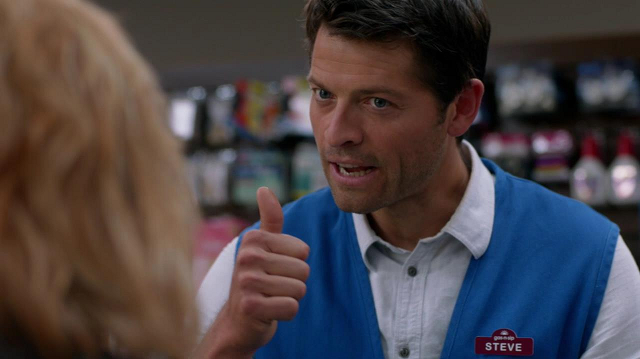
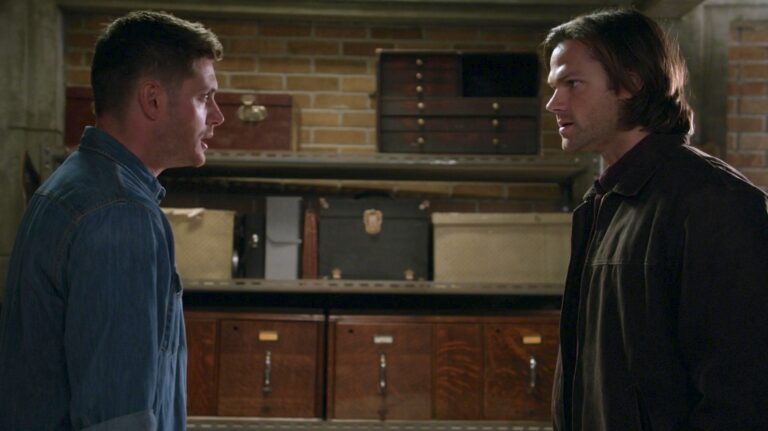
What a wonderful article. I loved reading your insights. The show as always been about the family bond between the brothers for me, and while I did not mind the angel storylines, I did not give them much analytical thought. Your article opened up whole new avenues of thinking for me.
Thanks also for the link to the Kripke interview. I had never read that before. Really fun to see how Kripke, Singer and the writers evolved in their thinking the first 4 seasons. I would love to see something similar for the next 4.
Finally – I cannot resist pointing out you called out Sebastian – the actor who plays Balthazar, rather than the character’s name. A small slip, but funny since we all know what a character the actor is, so makes sense he sometimes pushes ahead of the character he played in our consciousness.
Thanks again. This was a wonderful thing to read during the hellatus.
You totally caught my Freudian slip showing! Oops! Sebastian/Balthazar … Now that’s what I call funny!
Thanks for reading and commenting, and I’m glad you enjoyed it! I’m having a lot of fun with the Castiel analysis … Will finish it soon. Watch for it this coming week. 🙂
Great article! All the things I now know but don’t really articulate! My hubby and I actually talked the other day though about how Cas was probably brought back by God because he was really the only angel who took humanity’s side and they are supposed to be protecting God’s creations so glad we’re not the only ones who think that. Can’t wait to read the next one when its ready!
Many thanks! The Castiel piece looks at practical TV considerations that I think contributed to his design and development (including what Misha brought to his portrayal); psychological differences I perceive between Castiel and other angels; and how his experiences have changed him as a character. And I do address Naomi’s comments … 🙂
Watch for part two this coming week!
Oh good! Naomi’s comments threw me for a loop at first but then I realized it kinda makes sense given his history on the show. It even makes sense in terms of the episode we meet Jimmy because now we know what kind of “Bible camp” he was subjected to.
Thank you for an awesome read.
Thanks for reading, and glad you enjoyed!
A great University essay! Such a pleasure to be educated in Supernatural this way. I do nearly always agree with your interpretations, about 99.9% of the time, LOL
I was so grateful when the writers saw the light that was the chemistry of the combination of Jensen and Jared. Such a glowing intense light! When they began their ideas with the brothers and then took it from that standpoint. I began to notice this show as I liked horror film, but then stayed forever for the brotherly relationship above all. No matter if I enjoy or don’t enjoy an episode, the brothers always are the epicentre and always an enjoyment for me to follow their trials and I love them dearly. And so it will be, no matter the plots or monsters provided now and in the future for however long our show remains. May it be forever!
Saying that, for me, the epitome of my enjoyment of the show was from the Pilot unto the end of “Lazarus Rising”, even though in the latter, as soon as the brothers were reunited, Sam began his lying even as soon as the hug ended. It was the schism between them that negated my complete enjoyment of season 4, even though there were great episodes. I guess most people liked it best as it was a complete plot for the whole season which from beginning to end was cohesively written, but the love between them was missing. An episode to me may be beautifully written and acted but not enjoyed personally. Case in point: “Death’s Door”. There is no way I can ENJOY Bobby dying! no matter how well done. I believe that was Sera’s biggest mistake she ever made! Jim Beaver was awesome in it and it ripped out my heart but there was no enjoyment in it for me. That’s just my POV!
I truly believe there was, after season 3, a little too much killing off of beloved characters. These characters were so well written and so endearing, and it was so very devastating to have to watch them die, as if they were my own family. It began slowly in the first 3 seasons but escalated later on and became so very depressing, especially in season 7. Anyway, that’s just me.
I’m looking forward to your next essay and hope you will be writing down your thinky thoughts throughout our long long long hellatus to enlighten us students of yours, professor! 🙂
ps: The demon was Casey in Sin City, not Cassie. :-*
Thanks, Bevie! And I can’t believe I typed “Cassie” instead of “Casey” — sheesh!
I didn’t enjoy the “let’s strip Sam and Dean of all their support” concept; I prefer to see the brothers working with a network of other folk and having relationships beyond just their brother bond. I think the show is still working on figuring out that balance, however.
You’ll see more of my thoughts on the overall concept stuff in the Castiel article! I think you might agree with some of it … 🙂
Great article! And thanks for the link. I don’t think I’d read that its entirety before, though it made me miss Kripke even more.
You can definitely see the shift in the episodes once they started wrapping them around the boys. For me, it went from watchable to can’t miss to completely adored. It also made the show unique and put it leaps and bounds over other shows. They should have had Emmy nods and wins from S2-6.
I know some fans get upset with retconning but I’m usually only upset when it’s not done well. Supernatural did it fabulously (prior to S8). For a series it is almost impossible not to do some manipulating of prior info. But they managed to take the new ideas and fit them almost seamlessly into the whole picture. Even explaining most discrepancies. Which is impressive considering the number of shows, the complicated interweaving storylines and the amount of lore. They left me in awe with how well they did it. Next to the brother bond it was my favorite thing about the show.
I thought the addition of the angels was great and by in large happy with the outcome. (Maybe I need to watch Heaven and Hell again because I never had big problems with it, so maybe I missed something. I might have been distracted by Dean having Impala Sex.) And I think the angels being forced to understand humanity could be a good thing.
Thanks, Kelly!
My problems with [i]Heaven And Hell[/i] were the things that struck me as stupid: heaven literally being up in the sky, so falling angels came down as meteors (great visual, but [i]dum[/i]b …); “grace” also falling as a meteor, growing a tree, and being conveniently contained in a vial around Uriel’s neck; that kind of stuff. I’ve always appreciated how angels came in and what their addition did for the story.
Impala sex … ah, yes. Distracting … 🙂
Intriguing essay, thanks for putting your thoughts on this out there. I really liked how you placed it into context–the show history, the production considerations, and the in-story considerations.
“I continue to believe that an angel remains an angel, with powers or without” – this question is on my mind too. While Metatron said a few things that might hint otherwise, given the shape of Castiel’s arc especially so far, I wonder if S9 will in fact explore that issue directly with the angels. There’s a lot in SPN about identity and selfhood, as well as nature vs. nurture. Does Castiel cease to be an angel just because he’s lost his powers? As you pointed out, in The End he still had some perceptions and knowledge of an angel. The behavior may become closer to human because of the loss of power removes something that helped them feel more remote/above humanity. But do they cease to be who they are as a species?
I think SPN does use humanity as the standard, or shorthand, for the best moral state. We’ve seen in SPN that humanity is imperfect and often cruel, but the more positive aspects of being human has been held up as the goal to aim for to be considered “good.” In fact I think it’s more complex than that, despite that as a top layer, but what I’ve seen as a message is that it’s your decisions and actions and feelings that make you who you are. But at the basis, I think SPN does associate human values with goodness, and a supernatural creature who demonstrates compassion and positive emotion and makes moral decisions presented as more like human, therefore, humanity is the ideal. Personally I’m not sure how comfortable I am with this philosophy, and how does that fit with SPN’s ideas about how predetermination is not inevitable, and its powerful story about how family doesn’t end with blood.
It’s a type of genre/sf: humans are the good guys. Aliens invade, monsters attack humans…humans fight back. Another type has multiple species and attempts to avoid saying humans are inherently superior, the universe is diverse, and I prefer the latter approach, although compelling stories come out of the first. SPN seems caught between the two, because of its “monsters” that make choices about how to be, and we’ve had supernatural beings–Castiel the most prominent–that the audience relates to and feels for as it does for the human characters.
Anyway, I think the addition of angels, and Castiel’s introduction, was an exciting game-changer for the better. One reason SPN has endured is its willingness to shake things up. I know changes can damage a show and not everyone will agree what the good or bad changes are. But where would SPN be if it had stayed with its original concepts on the brothers, and I do think S4 and Castiel and all the angels opened up the show in powerful ways. The next game changer on that level is the introduction of the MoL, and like the brother emotional story and the introduction of angels, seems likely to have far-reaching impact on the world of SPN and the characters.
Looking forward to your piece on Castiel. I’m fascinated in particular with how far this character pushes Bobby’s family don’t end with blood concept. Someone not only a different species but of such a drastically different culture and experience, could form this strong a bond with the Winchesters. Also given SPN’s basic core idea about humanity vs the Other, that a non-human character could have a hero’s journey and carry such emotional/narrative weight.
Thanks, Dot!
On the human/other front: I think Supernatural goes with humans being the pinnacle because that’s what the whole creation thing implies with God telling the angels to bow to humans. But all humans are not equal, either; it’s clear that the choices we individuals make determine whether we are worthy of admiration or not. And the Winchesters have come to extend that to others, including monsters; recognizing goodness in beings that chose not to kill.
I love the way this show keeps developing! And I’ve got a look at the MoL in the works … 🙂
“My basic premise is that angels and humans remain fundamentally different… They lack our native emotions, our creativity, our multiple passions, our willingness to sacrifice ourselves for those we love.”
I don’t know that I see it this way… I’ve always felt that the show has underlined the similarities, and I find that quite interesting – the shades of gray we see in the angels as well as the demons. The angels seem prey to the same negative forces – jealousy, insecurity, arrogance, deceit – as humans, as well as the same positive elements: love, loyalty, faith, sacrifice for those they love. Castiel is the exemplar of all of those aspects, particularly the final one, and I think there very much is a humanity to him (and to the other angels). I do like the notion that he and the other angels understand humans only imperfectly… but you know, I think that applies to most humans too!
“a TV show is a constantly changing and developing collaborative activity affected not only by the creative imaginations of the different showrunners and writers participating in the room from year to year, but by real-world considerations that close and open doors the writers and showrunners hadn’t ever expected.”
Oh thank you, thank you. One of the most frustrating things about participating in online forums associated with this show is the blind contention from some fans that the show must never-should never had evolved, and the brothers must never-should never have progressed from their baseline characterization, when it’s highly unlikely that it would have survived this long if those things hadn’t occurred.
Thanks, Kate! And also, you’re welcome!
I agree that angels have many emotions similar to ours, although they lack the physical components. Part of what I wanted to do here, however, was to highlight the differences precisely because I think the typical emphasis on the similarities makes us forget the differences too easily and then get upset when they appear and have effects. 🙂
I love the way this show gives us so many shades of grey in both heroes and monsters, even turning the tables on which are which sometimes. Kind of like life, hmm?
I’m so interested to read your upcoming Cas meta. I’ve long been fascinated by the notion of a human Cas without a soul (tho I got the impression that Metatron might have somehow given him one?). But assuming he is a soulless human, well: we saw how that impacted Sam. Could Cas grow a soul? Also interesting to speculate, I think. Your reference to 2014!Cas likely having no soul to replace his lost grace: I hadn’t thought of that. I’m now doing a sort of mental compare and contrast as to whether there are any similarities in that portrayal of Cas and the show’s version of soulless Sam. And we saw that 2014!Cas did still have feelings for Dean, and loyalty to Dean. It’s interesting to wonder if it was a sort of intellectual, mechanical loyalty borne of expedience, much like soulless Sam’s seemed to be.
I’m also interested to see how you will factor in what we found out about angel bible camp via Naomi. It’s interesting to speculate on how this affected Cas’s behavior after he was returned to his vessel in 4.20 (as we’ve been shown how outside forces have mitigated Sam’s behavior). And yet Dean still broke through to Cas, much as he did in 8.17. The depth of that bond has become a vital element of this show for me and so many fans.
I think a soulless human is totally different than — whatever an angel is after it’s flung out of Heaven. Angels never *had* souls, according to the show’s theology, so their absence wouldn’t manifest the way Sam’s soullessness did. Without a soul, Sam had no conscience, no awareness of right or wrong, no empathy; we’d call him a sociopath. He also didn’t need to sleep. But he was missing something that had been essential to his character.
It’s never been clear to me precisely what an angel’s “grace” is. When Anna regained hers, she regained all of her powers and exploded out of her human body; she acknowledged in [i]On The Head Of A Pin[/i] that her human body had been destroyed at the time. But before that happened, she had remembered who and what she was. She had her feelings and emotions, and empathized strongly with Dean. She lacked her grace, but that clearly didn’t equate with a human lacking soul. I kind of thought about her grace as being that which allowed her to connect with the power of Heaven – to connect with the power of souls. And that idea seemed to mesh with 2014!Cas becoming mortal and losing his powers as he lost contact with Heaven after the departure of the other angels. That would imply that an angel’s grace is distinct from – whatever you would call that which gives an angel its personality and self-identity. 🙂
I’m looking forward to learning where this all is going!
Thank you for the read!
Now, there’s one thing I don’t get. In S6 (episode 20 if I’m not mistaken) Cas told Crowley,”I’m an angel, I have no soul to sell”. Instead of a soul, angels have their grace (wings, powers, whatever).Obviously, grace is not the same as personality since Cas himself several times throughout the series has lost his mojo and still remained basically the same person. But how could the angels “grow” souls? If they are capable to turn into humans, it looks like demotion for them, and doesn’t that mean that they are actually superior things comparing to humans?
Your welcome! Thanks for reading!
On the soul issue: the Castiel meta coming up gets into this a bit more, but in the show’s theology, angels don’t have souls. I don’t think “grace” is what takes the place of a soul, though; I think the show’s take on “grace” is that it’s what grants an angel access to the power of souls and Heaven. My rationale for that came from watching what happened to Anna. She recovered her memories and was fully equipped with emotion and empathy well before she reclaimed her grace; it seemed that the only thing recovering her grace did was reconnect her full-force to the power of Heaven, blasting away the mortal shell that he had worn. But what made her, herself, was already there.
If you look at my commentary on Sacrifice, you’ll see that I had a LOT of problems with the whole concept of angels being dumped willy-nilly as mortals on Earth and with Metatron telling Castiel to seek him out when he died and returned to Heaven, not least because I see no way that an angel would *acquire* a soul and thus have a soul that would go to Heaven. The whole idea of angels becoming human has NEVER made sense to me, and has never been explained in the show.
I’m waiting to see what the heck the writers come up with to explain that one … *wry grin*
Thank you for the reply, Bardicvoice!
I remember reading in some Tolkien’s book that firstly the elves (supernatural creatures remotely similar to angels, no?) were created, and they were given beauty, youth and immortality. And then people were made, and they were gifted with aging, diseases and death. Period. Boy, was I impressed!That’s metaphysics to you, it doesn’t imply any explanations, at least any rational ones. Instead it gives – what? Metaphors, myths, moral lessons, that is things which can hardly be articulated. So, since the show goes deeper and deeper into these obscure realms I’m not waiting for the miracle to explain. Would be sure path to dissatisfaction IMO.
Very interesting article. I believe Castiel retains his memory because he looked distraught as he gazed at his family falling. I believe that the fallen angels will retain their graces. Metatron said he was using the same spell that had been employed to cast out Lucifer was presented as angelic, especially in terms of his powers and vessel limitations. I realize that we saw burning wings. I believe that was a metaphor to convey that they no longer can reach heaven. Being cut off from heaven will reduce their powers most likely; however I am anticipating a lot of angelic MotW episides. I would not be surprised if the idea of angels becoming human came from tge Wenders’ film Wings of Desire.
I’m curious to see what we’re going to learn; I have no idea. I do think Castiel remembers, for many reasons. The others … I can see many different ways things could go, and all I can do is wait to learn what the writers will reveal to us as the story progresses. I’m looking forward to it!
Must confess, I’m not familiar with that movie. I might look it up; thanks!
Thought provoking article. I, personnally loved S4 and the Heaven and Hell episode as well. I think it moved the show from a monster of the week concept to something deeper and more interesting and more complicated. I don’t have a huge problem with canon being twisted a little here and there to further the story line since 8 years is a long period of time and sometimes what worked 4 years ago can’t work now. The heart of the show is the brother’s relationship and their interaction with other characters in the show and all the moral dilemmas they face. Part of the reason I found S7 so hard to watch was the feeling of disconnect between the brothers themselves and the loss of connection with others as well.
I agree with Castiel’s cat about the angels falling to earth. I know Metatron took away Castiel’s grace but did he take away the grace of the other angels? I don’t know that falling to earth necessarily means losing their grace only their connection to heaven. Did Lucifer stll have his grace? I guess we’ll just have to wait and see. JC has come up with a very ambitious storyline and I hope he hasn’t gotten in over his head.
Thanks for the link to the Kripke interview. I hadn’t read it before and found it really interesting, especially Bob Singer’s early input, since he is still with the show.
This season’s finale left me with less angst then usual and more curiosity about where the show is going. Can’t wait for Oct.
Thanks, Prix68!
Make no mistake: I loved season 4 and the way the introduction of the angels expanded the show’s mythology! I just had to poke a little fun at the process, and to me, some of the ideas (like angels and souls literally falling from the sky) really were dumb, although they later made for some impressive visuals. 🙂
The show never really defined “grace,” other than Anna describing it as power and exploding out of her mortal shell into the full brilliance and energy of her angelic aspect when she regained hers. My best guess is that “grace” provides the angel’s link to the power of Heaven.
This is just speculation, but I think Lucifer was either stripped of his grace when he was expelled from Heaven, or otherwise had his power source reassigned from the souls in Heaven to the souls in Hell. I’m curious to see what the writers’ room comes up with during this season!
Great article, Bardicvoice. It will be fascinating to see where they go with this next season. It wasn’t clear to me in Sacrifice whether the fallen angels had lost their grace, lost all of their abilities, or just lost their wings. It’s also a little bit confusing in that angels aren’t visible to most humans and that’s why they have to take a vessel – this implies that all angels have vessels? If memory serves, in S5, Castiel still had his grace but was “cut off” from heaven and only had limited angel abilities. So being cut-off from heaven means you can’t tap in to the power of human souls?
You’re right, that entire S4 Anna and her grace thing had me scratching my head; that two part episode started out so strong with the back story of Sam’s time after Dean went to hell, but kind of fizzled out because of the Anna and her grace thing.
Here’s hoping for some real character growth for Castiel next season. Like everyone, I laughed at his shopping trip and looking for pie in the Quickie-Mart thing but the fish out of water routine has gotten old.
Thanks, njspnfan! I’m with you in waiting with bated breath to see how this all plays out … 🙂
My apologies, folks: sometime in July, the Chicago Tribune deleted from their website the “featuresblogs” section that included Mo’s amazing 2009 Kripke conversation transcript. You can’t even find it searching in the Trib online archives. I’m checking with Mo to see if there’s any way people will be able to see the content again somewhere. I have a copy I saved before it disappeared, but there would be copyright issues in posting it outside the Trib without permission. If I can secure a new link, I’ll provide it. Again, sorry!
And I’m delighted to report that Mo Ryan gave us permission to put her Kripke interview transcript right here on The Winchester Family Business! With thanks to our fearless leader Alice, the link to Mo’s article will take you to it again; go and read! Unfortunately, the Chicago Tribune deleted the accompanying videos from their YouTube site, and we don’t have access to those – but Mo’s interview article contains the complete transcript of her discussion with Kripke, so we’re golden!